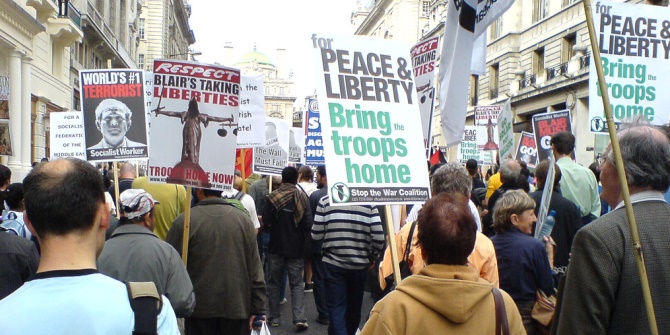 Celia G. Parker writes that albeit not being perfect, the National Security Council provides the best system the UK has had for the discussion and implementation of national security strategy. Failing to employ it as it was designed may result in a less effective, less transparent, and less accountable national security decision-making system.
Celia G. Parker writes that albeit not being perfect, the National Security Council provides the best system the UK has had for the discussion and implementation of national security strategy. Failing to employ it as it was designed may result in a less effective, less transparent, and less accountable national security decision-making system.
In 2010, former Prime Minister David Cameron and his coalition government introduced a range of reforms to the UK’s national security machinery, with the aim of creating a ‘Strong Britain in an Age of Uncertainty’. Ten years later, in the midst of a global pandemic and with the UK’s future relationship with the EU still unclear, it could be assumed that the objective of Boris Johnson’s government would be the same. However, some of the improvements to the national security machinery since 2010 have been scaled back in the past year, especially since the December 2019 General Election. Reports suggested that the National Security Council (NSC), designed as the home of strategic decision-making on national security and a focal point of the 2010 reforms, did not meet at all between January and July 2020. Although the pandemic doubtless provided a significant distraction to Johnson, who chairs the NSC, COVID-19 itself should have been reason for the NSC to meet regularly. Its rare use this year and the political appointment of David Frost, Johnson’s current chief negotiator with the EU, as National Security Adviser (NSA) have both brought into question what the future holds for the NSC and the other structures created by the 2010 reforms.
The NSC is not perfect. Despite having been designed to improve a perceived weakness in how long-term national security strategy was formulated and implemented, it has been accused of focusing too much on tactical rather than strategic issues, the former of which should be dealt with at the Cabinet Office Briefing Rooms, or elsewhere. There has been some serious criticism from those who have interacted with it in recent years, for example from former Conservative Cabinet member Rory Stewart, who described it as a ‘joke’. However, before Johnson’s premiership, the NSC had made some significant improvements to national security decision-making. For example, the NSC forum marked a departure from the days of former Prime Minister Tony Blair’s often opaque, sofa government style of interacting with intelligence and security officials. The NSC instead reflected the British tradition of Cabinet committees and collegiate decision-making on national security and intelligence issues. Reports earlier this year of the heated discussions about Huawei’s involvement in the UK’s 5G network also suggest that the NSC had finally facilitated the challenge function which had been missing in the early years of its life and before its creation, particularly under Blair’s premiership.
One of the most important improvements made to the system by the creation of the NSC is the theoretical reduction in the impact of the personality of prime ministers on the use of intelligence, mainly as a result of the more formal system of interaction between intelligence and policymakers, which the NSC enables. However, as I argued earlier in 2020, the NSC is neither a permanent nor a statutory body, and so its effectiveness remains at the whim of the prime minister of the day. Its use since Johnson’s 2019 General Election victory is a case in point. Under former prime ministers Cameron and Theresa May, the NSC met most weeks (chaired by the PMs themselves) and was used as the forum to make significant national security decisions. Johnson, on the other hand, has not regularly convened the NSC. There were even reports that NSC meetings have been cancelled as a result of disagreements with his Cabinet colleges, a sign that Johnson has not been using the NSC as the clearing house for discussions on national security.
Although Johnson’s non-use of the NSC began before the COVID-19 pandemic took over the government’s focus this year, the government has attributed the pandemic to the disruption. Not only was the pandemic itself a disruption, but Johnson’s own ill-health would have postponed at least his involvement in the NSC meeting. An explanation, therefore, for the NSC’s absence could be Johnson’s desire to keep control of its chairmanship, suggesting his leadership style is more authoritarian than collegiate in nature, as was Cameron’s. Another indication of Johnson’s leadership style, and his attitude towards an objective and challenge-orientated role for the NSC, is his recent appointment of Frost as the new NSA. This position has traditionally been filled by a career civil servant with experience working with the UK’s intelligence and security machinery. The outgoing postholder, Sir Mark Sedwill, for example, spent a career working within or alongside the military, Home Office and Foreign and Commonwealth Office, giving him the experience required to fulfil such an important bridging role between politicians and government experts on national security. It has yet to be seen how the political appointment of Frost as NSA will change nature of this role. It may well shift the balance from objective arbitrator between Number 10 and national security officials to Number 10’s representative on national security. If this does transpire, some of the positive impact of the 2010 reforms will certainly have been lost.
In terms of the NSC’s role in relation to the pandemic, its absence until July 2020 is difficult to justify. Without doubt, the pandemic required rapid tactical and operational decision-making, neither of which should have been done at the NSC. However, the pandemic has also created a range of long-term national security challenges, beyond the obvious review of the UK’s relationship with China. Health security has jumped to the top of the agenda, presumably resulting in a shift of the resources allocated by intelligence and security officials towards this new area of focus (although, as many commentators have argued, the threat of a pandemic has been on the national security agenda for much longer). In 2014, Cameron laid out his widened definition of national security to include environmental and health threats, and recent commentators have suggested the definition be widened even further, partly as a result of the pandemic. The Royal United Service Institute (RUSI), for example, has argued that the planned Integrated Review being undertaken by the government into national security and defence should, for the first time, bring economic security and financial services into the national security agenda. Quite properly, the financial health of the country has been interwoven with the government’s response to the pandemic, so this is a logical extension.
Without meeting, however, the NSC cannot tackle any of these challenges. If used as designed, the NSC and its accompanying bodies, like the National Security Secretariat, provide, arguably, the best system the UK has had for the discussion and implementation of national security strategy. On the contrary, failing to employ it as it was designed may well result in a significantly less effective, less transparent, and less accountable national security decision-making system. At a time when the UK needs all the strategic strength it can muster, this should not be the government’s approach.
_______________________
 Celia G. Parker is a PhD candidate in the War Studies Department of King’s College London and a member of the King’s Intelligence and Security Group (KISG). Her research focuses on reform of central leadership and management of the UK’s Intelligence Community.
Celia G. Parker is a PhD candidate in the War Studies Department of King’s College London and a member of the King’s Intelligence and Security Group (KISG). Her research focuses on reform of central leadership and management of the UK’s Intelligence Community.
Featured image credit: Number 10 on Flickr, Boris Johnson Premier Education Summer Camp (CC-BY-NC-ND 2.0).







1 Comments